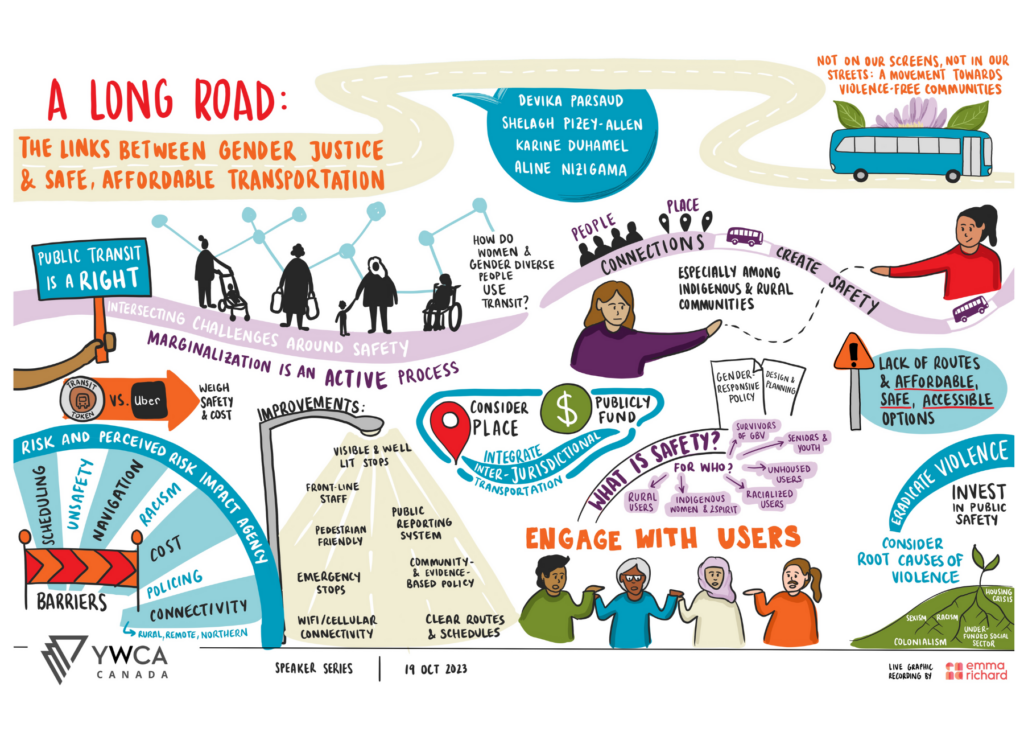The safety of women, girls and gender diverse people on transit is a critical dimension of gender equity. Canada, with its vast and diverse landscape, faces unique challenges in ensuring safe, affordable, and accessible public transportation for all. Mobility shapes the conditions and lived experiences of gender, poverty, disabilities, and older-age. On October 19th, 2023, YWCA Canada hosted a panel discussion on the rise of gendered violence on public transit, the ongoing crisis of missing and murdered Indigenous women, girls, and Two-Spirit people; and the implications of uneven or unreliable transport availability.
During the conversation, panelists recognized that there remains a long road towards building gender-responsive transit systems as part of the critical social infrastructure to end and prevent Gender-Based Violence in Canada. When it comes to women and gender diverse individuals, Indigenous, and rural communities, availability of transportation is not merely a logistical challenge but a safety imperative. With limited routes and safety measures, many struggle to access essential services and employment opportunities. Also highlighted were design-based and urban planning approaches as well as community-based safety models that attend to the needs and nuances of every community.
YWCA Canada’s CEO, Aline Nizigama, pointed to the movement’s consistent and grounded efforts to prevent violence, protect communities, and support those who are most impacted. She acknowledged the many diverse needs and distinct barriers related to mobility. Aline noted that women and gender diverse people cannot travel alone or in public without a heightened awareness of their surroundings and without considering every aspect of their route planning – from the outfit they wear, to the number of streetlights between their stop and destination, whether they have headphones in, or their keys, phones, or a safety device ready. This is the product of a culture that has normalized the safety concerns of women and placed the onus on us to be hyper vigilant and prepared. We need to shift the narrative to ensure governments make holistic interventions and meaningful investments into safety.
Dr. Karine Duhamel traced the effects of declining options for public transportation in Western Canada that have deep impacts on northern, rural, and remote communities and disproportionately affects Indigenous peoples. Safe and accessible transit options makes possible the full participation of Indigenous women and Two-Spirit plus people in all aspects of society. Without equitable transit options that support the rights and needs of all users, there is a limit to people’s abilities to engage with culture, families and communities that ultimately bring them safety. We need more inclusive research to inform policy and service decisions.
Turning to urban perspectives, Devika Parsaud shared findings from a poll WomanACT conducted with Angus Reid Group. Overall, feelings of transit safety are impacted by gender and race. 59% of women experience unwanted looks, gestures, or sexual comments on transit. Gender-responsive policies, services and infrastructure are needed to address the rights, needs, safety, and comfort of all riders. This includes well-lit stops, secure waiting areas, placement of bus stops with bystanders near, clear and publicly available reporting mechanisms, safety policies, more frequent services during weekends, evenings and nighttime, and increased use of technologies like phone services and security cameras. Restrictions to mobility exclude people from opportunity, access and participation in employment, education, health, social and leisure activities. Inclusive design can create an environment where everyone feels safe and empowered to utilize public transit.
Shelagh Pizey-Allen stressed the importance of consultation for transport solutions that align with community values. The fact that people do not feel safe on transit systems is a failure of public services. In response, policing is increased on transit systems, however this just adds to the insecurity. Black and Indigenous people are 2 to 3 times more likely to be targeted for fare enforcement or carding than white users in Toronto. A non-police enforcement response to addressing violence, harassment and crisis is vital to ensuring safer public transit and public spaces. We need robust responses that consider women’s distinct travel patterns, needs, and experiences.
Emma Richard captured this dynamic exchange through a graphic recording. The panel took place during our annual Week Without Violence, focused on the theme Not on Our Screens, Not on Our Streets this year. Learn more about our advocacy throughout this annual campaign and access our toolkit here.
